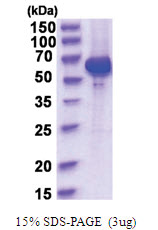AKT1 / PKB (1-480, His-tag) Human Protein
Other products for "AKT1"
Specifications
| Product Data | |
| Species | Human |
| Expression cDNA Clone or AA Sequence |
MSDVAIVKEG WLHKRGEYIK TWRPRYFLLK NDGTFIGYKE RPQDVDQREA PLNNFSVAQC QLMKTERPRP NTFIIRCLQW TTVIERTFHV ETPEEREEWT TAIQTVADGL KKQEEEEMDF RSGSPSDNSG AEEMEVSLAK PKHRVTMNEF EYLKLLGKGT FGKVILVKEK ATGRYYAMKI LKKEVIVAKD EVAHTLTENR VLQNSRHPFL TALKYSFQTH DRLCFVMEYA NGGELFFHLS RERVFSEDRA RFYGAEIVSA LDYLHSEKNV VYRDLKLENL MLDKDGHIKI TDFGLCKEGI KDGATMKTFC GTPEYLAPEV LEDNDYGRAV DWWGLGVVMY EMMCGRLPFY NQDHEKLFEL ILMEEIRFPR TLGPEAKSLL SGLLKKDPKQ RLGGGSEDAK EIMQHRFFAG IVWQHVYEKK LSPPFKPQVT SETDTRYFDE EFTAQMITIT PPDQDDSMEC VDSERRPHFP QFSYSASGTA LEHHHHHH
|
| Tag | His-tag |
| Predicted MW | 56.7 kDa |
| Concentration | lot specific |
| Purity | >90% by SDS - PAGE. |
| Presentation | Purified |
| Buffer | Presentation State: Purified State: Liquid purified protein Buffer System: Phosphate buffered saline (pH 7.4), 20% glycerol |
| Endotoxin | < 1.0 EU per 1 microgram of protein (determined by LAL method) |
| Preparation | Liquid purified protein |
| Protein Description | Recombinant human AKT1, fused to His-tag at C-terminus, was expressed in insect cell and purified by using conventional chromatography techniques. |
| Storage | Store undiluted at 2-8°C for one week or (in aliquots) at -20°C to -80°C for longer. Avoid repeated freezing and thawing. |
| Stability | Shelf life: one year from despatch. |
| Reference Data | |
| RefSeq | NP_001014431 |
| Locus ID | 207 |
| UniProt ID | P31749, B0LPE5 |
| Cytogenetics | 14q32.33 |
| Synonyms | AKT; PKB; PKB-ALPHA; PRKBA; RAC; RAC-ALPHA |
| Summary | This gene encodes one of the three members of the human AKT serine-threonine protein kinase family which are often referred to as protein kinase B alpha, beta, and gamma. These highly similar AKT proteins all have an N-terminal pleckstrin homology domain, a serine/threonine-specific kinase domain and a C-terminal regulatory domain. These proteins are phosphorylated by phosphoinositide 3-kinase (PI3K). AKT/PI3K forms a key component of many signalling pathways that involve the binding of membrane-bound ligands such as receptor tyrosine kinases, G-protein coupled receptors, and integrin-linked kinase. These AKT proteins therefore regulate a wide variety of cellular functions including cell proliferation, survival, metabolism, and angiogenesis in both normal and malignant cells. AKT proteins are recruited to the cell membrane by phosphatidylinositol 3,4,5-trisphosphate (PIP3) after phosphorylation of phosphatidylinositol 4,5-bisphosphate (PIP2) by PI3K. Subsequent phosphorylation of both threonine residue 308 and serine residue 473 is required for full activation of the AKT1 protein encoded by this gene. Phosphorylation of additional residues also occurs, for example, in response to insulin growth factor-1 and epidermal growth factor. Protein phosphatases act as negative regulators of AKT proteins by dephosphorylating AKT or PIP3. The PI3K/AKT signalling pathway is crucial for tumor cell survival. Survival factors can suppress apoptosis in a transcription-independent manner by activating AKT1 which then phosphorylates and inactivates components of the apoptotic machinery. AKT proteins also participate in the mammalian target of rapamycin (mTOR) signalling pathway which controls the assembly of the eukaryotic translation initiation factor 4F (eIF4E) complex and this pathway, in addition to responding to extracellular signals from growth factors and cytokines, is disregulated in many cancers. Mutations in this gene are associated with multiple types of cancer and excessive tissue growth including Proteus syndrome and Cowden syndrome 6, and breast, colorectal, and ovarian cancers. Multiple alternatively spliced transcript variants have been found for this gene. [provided by RefSeq, Jul 2020] |
| Protein Families | Druggable Genome, ES Cell Differentiation/IPS, Protein Kinase |
| Protein Pathways | Acute myeloid leukemia, Adipocytokine signaling pathway, Apoptosis, B cell receptor signaling pathway, Chemokine signaling pathway, Chronic myeloid leukemia, Colorectal cancer, Endometrial cancer, ErbB signaling pathway, Fc epsilon RI signaling pathway, Fc gamma R-mediated phagocytosis, Focal adhesion, Glioma, Insulin signaling pathway, Jak-STAT signaling pathway, MAPK signaling pathway, Melanoma, mTOR signaling pathway, Neurotrophin signaling pathway, Non-small cell lung cancer, Pancreatic cancer, Pathways in cancer, Progesterone-mediated oocyte maturation, Prostate cancer, Renal cell carcinoma, Small cell lung cancer, T cell receptor signaling pathway, Tight junction, Toll-like receptor signaling pathway, VEGF signaling pathway |
Documents
| FAQs |
| SDS |
Resources
Recombinant Protein Resources |
{0} Product Review(s)
0 Product Review(s)
Submit review
Be the first one to submit a review
Product Citations
*Delivery time may vary from web posted schedule. Occasional delays may occur due to unforeseen
complexities in the preparation of your product. International customers may expect an additional 1-2 weeks
in shipping.






























































































































































































































































 Germany
Germany
 Japan
Japan
 United Kingdom
United Kingdom
 China
China
